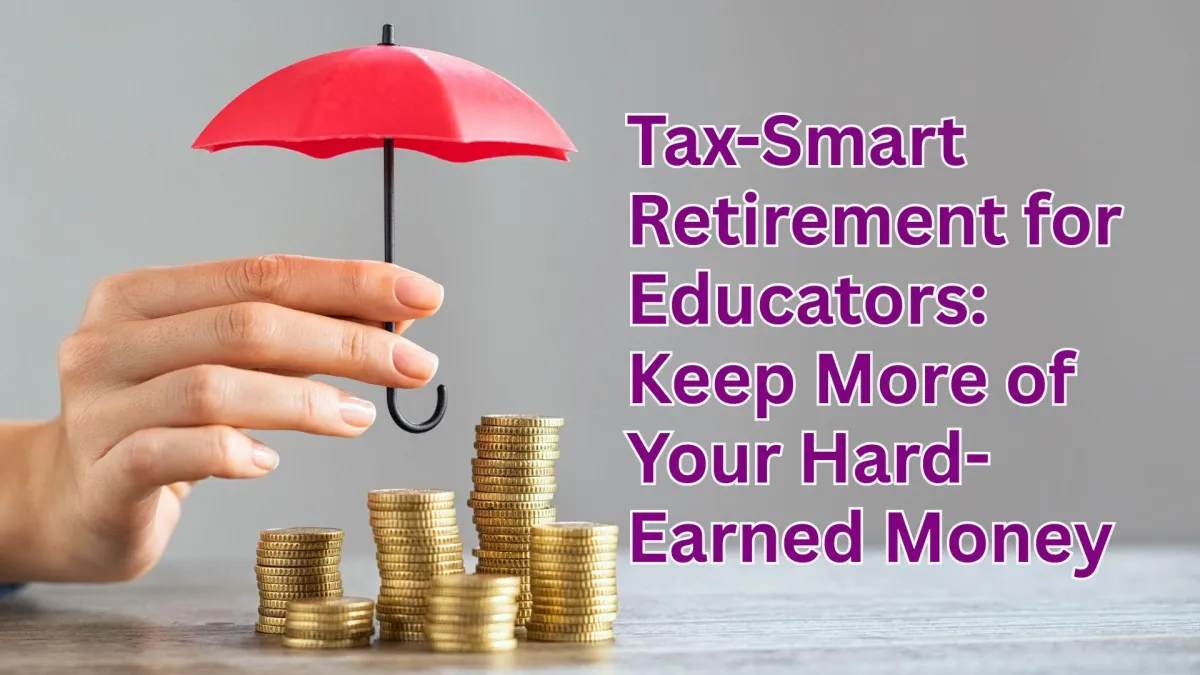




Tax-Smart Retirement for Educators: Keep More of Your Hard-Earned Money
Introduction: Retire Smarter, Not Harder
You’ve spent your career shaping young minds, grading endless papers, and surviving cafeteria duty—now it’s time to focus on YOU. Retirement should be a time of joy and relaxation, not one filled with unexpected tax burdens.
Unfortunately, many educators find themselves blindsided by taxes in retirement. How much of your pension will be taxed? Will Social Security reduce your benefits? Should you consider a Roth conversion? Let’s break it all down so you can retire with confidence and keep more of your hard-earned money!
Understanding How Your Retirement Income Is Taxed
Before diving into solutions, it’s crucial to understand how different sources of retirement income are taxed.
1. Your Pension & Taxes
Most state-sponsored teacher pensions are fully taxable as ordinary income. This means when you start receiving payments, Uncle Sam gets a cut based on your tax bracket.
2. Social Security & Taxes
Educators who qualify for Social Security may be shocked to learn that up to 85% of their benefits could be taxable! The amount depends on your combined income, which includes:
Adjusted Gross Income (AGI)
Nontaxable interest
Half of your Social Security benefits
3. 403(b) and 401(k) Plans
If you contributed to a traditional 403(b) or 401(k), withdrawals are taxed as ordinary income. And here’s the kicker—once you hit your early 70s, the IRS forces you to take Required Minimum Distributions (RMDs), even if you don’t need the money.
Smart Tax Strategies for Educators
The good news? There are ways to legally reduce your tax bill in retirement! Here’s how:
1. Consider a Roth Conversion
Thinking of converting your traditional IRA or 403(b) to a Roth IRA? Here’s what you need to know: ✅ Pay taxes now to enjoy tax-free withdrawals later
✅ No RMDs—keep your money growing longer
✅ Best if you expect to be in a higher tax bracket in retirement
2. Withdraw Wisely
A well-planned withdrawal strategy can help you minimize taxes:
Start with tax-free sources like a Roth IRA or Cash Value Life Insurance
Next, pull from taxable investment accounts (stocks, bonds)
Lastly, withdraw from traditional 403(b)s or pensions (since these are fully taxed)
3. Utilize Tax-Free Income Sources
If you’re worried about taxes eating up your retirement income, consider:
Health Savings Accounts (HSAs): Triple tax advantage for medical expenses
Municipal Bonds: Generate tax-free interest
Cash Value Life Insurance: Provides tax-free withdrawals
4. Time Your Social Security Benefits Right
Delaying Social Security until full retirement age (FRA) or later can:
Increase your monthly benefit amount
Reduce the percentage subject to taxation
5. Take Advantage of Educator Tax Breaks
Even in retirement, you may qualify for educational expense deductions if you continue working part-time or tutoring.
FAQs: Common Questions from Retired Educators
1. How do I know if a Roth conversion is right for me?
It depends on your tax bracket now vs. in retirement. If you expect to be in a higher bracket later, converting earlier could save you money.
2. What states are the most tax-friendly for retired teachers?
States like Florida, Texas, and Nevada have no state income tax, making them ideal for retirees looking to reduce their tax burden.
3. Do Required Minimum Distributions (RMDs) apply to Roth IRAs?
Nope! Roth IRAs don’t have RMDs, making them a great tool for tax-free growth.
4. Can I deduct any educator-related expenses in retirement?
Yes! If you do consulting, tutoring, or part-time teaching, you may still qualify for deductions on work-related expenses.
Conclusion: Secure Your Tax-Smart Retirement
Planning for retirement taxes may not be glamorous, but it’s essential if you want to maximize your income and reduce financial stress. By understanding your tax obligations and implementing these smart strategies, you can keep more of your hard-earned money and enjoy the retirement you deserve!
💡 Next Steps:
✅ Meet with a financial advisor specializing in educator retirement
✅ Review your tax bracket and retirement income sources
✅ Consider Roth conversions, tax-free income sources, and withdrawal strategies
Have more questions? Drop them in the comments or reach out for a personalized retirement tax strategy session!
CONTACT
Evergreen Retirement Services
7537 Mentor Avenue Suite 208
Mentor, Ohio 44060
440-306-8349
info@evergreenrs.net
OUR COMPANY
OUR SERVICES
Turning 65 & Medicare
Medicare Supplement
Medicare Advantage
Prescriptions
Dental - Vision - Hearing
© 2023 copywriten yourmedicareoptions.net All written content on this site is for information purposes only. Opinions expressed herein are solely those of Evergreen Retirement Services and our editorial staff. Material presented is believed to be from reliable sources; however, we make no representations as to its accuracy or completeness. All information and ideas should be discussed in detail with your individual financial professional prior to implementation. Insurance products and services are offered through Evergreen Retirement Services. Evergreen Retirement Services and Debora & Dave Majher are not affiliated with or endorsed by the Social Security Administration or any other government agency. This content is for informational purposes only and should not beused to makeany financial decisions. Exclusive rights to this material belong to Evergreen Retirement Services. Unauthorized use of the material is prohibited. “We do not offer every plan available in your area. Any information we provide is limited to those plans we do offer in your area. Please contact Medicare.gov or 1-800-MEDICARE to get information on all of your options.”

